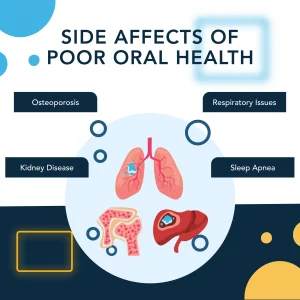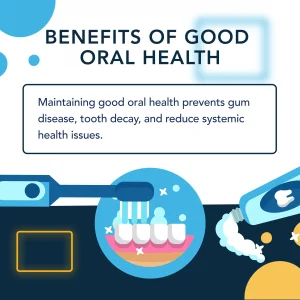You might be surprised to learn that oral health serves a crucial role in your overall well-being and general health. The condition of your mouth, teeth, and gums can significantly influence and reflect the state of your body by revealing signs of systemic diseases before they are detectable elsewhere.
Poor oral hygiene can lead to dental issues like gum disease and cavities, and it’s also linked to more severe health problems, including heart disease, diabetes, and stroke. This article will explore the specific diseases and conditions connected to oral health and provide insights into how maintaining good oral hygiene can prevent these diseases and contribute to a healthier lifestyle.
 Health Conditions That Have Been Linked to Oral Health
Health Conditions That Have Been Linked to Oral Health
The link between oral health and overall health is undeniable, with research revealing that dental conditions can be associated with a myriad of health issues beyond the mouth. Conditions like kidney disease, sleep apnea, and osteoporosis, as well as complications during pregnancy and respiratory illnesses, have all been linked to the state of one’s oral health.
Cardiovascular Disease
Bacteria from inflamed gums can enter the bloodstream, leading to arterial plaque buildup and increasing the risk of heart attacks and strokes. Once in the bloodstream, these bacteria can also affect the lining of your heart chambers and valves, potentially leading to endocarditis, a serious condition where the inner lining of the heart becomes infected.
Stroke
Stroke is another heart condition that has been linked to oral health through the inflammation and infections caused by periodontal (gum) disease. Similar to cardiovascular disease, the bacteria responsible for periodontal disease can enter the bloodstream and form arterial plaques. These plaques can obstruct blood flow, significantly increasing the risk of stroke.
Diabetes
Diabetes and oral health have a bidirectional relationship. Poor oral health, especially gum disease, can complicate diabetes control by influencing blood sugar levels. Conversely, diabetes can increase the risk of gum disease, infections, and slow healing in the mouth due to impaired blood flow and higher susceptibility to bacterial infections.
Respiratory Disease
Poor oral hygiene can lead to the inhalation of bacteria from infected teeth and gums into the lungs, contributing to conditions like pneumonia and chronic obstructive pulmonary disease (COPD). Regular dental care from your Plantation dentist reduces the bacterial load in the mouth, thereby decreasing the risk of respiratory infections and further health issues caused by poor oral health.
Kidney Disease
Poor oral hygiene can exacerbate kidney problems, with periodontal disease heightening the risk of severe infections, particularly in individuals with kidney disease whose immune systems may be compromised. Kidney issues can result in changes in the mouth, including dry mouth, a metallic taste, and gum inflammation.
Osteoporosis
Osteoporosis, a condition characterized by weakened bones, can significantly impact the jawbone and teeth, leading to bone loss in critical areas. Individuals with osteoporosis may experience a reduction in bone density in the jaw, which not only predisposes them to tooth decay but also results in loose teeth or tooth loss.
Rheumatoid Arthritis
Rheumatoid arthritis (RA) involves the body’s immune system mistakenly attacking the lining of the joints (synovium), causing an inflammatory response. Individuals with RA may find their condition worsened by poor oral health since gum disease can increase inflammation throughout the body and increase RA symptoms.
Alzheimer’s Disease
Research suggests a link between severe gum disease and Alzheimer’s disease. Bacteria from gum infections may travel to the brain, potentially contributing to Alzheimer’s development or progression. To maintain overall brain health and reduce the risk of Alzheimer’s disease, it’s important to schedule regular dental checkups with your dentist in Plantation, Florida.
Pregnancy & Birth Complications
Poor oral health during pregnancy, particularly periodontal disease, is associated with premature birth and low birth weight. The bacteria from gum infections can increase systemic inflammation, which may trigger preterm labor by elevating levels of prostaglandins, substances that induce labor. As a result, untreated gum disease in pregnant women significantly increases the risk of delivering prematurely, which can negatively impact the health of the newborn.
Cancer
Studies have found associations between gum disease and certain types of cancer. While it remains unclear what drives the increased risk, research has shown that greater exposure to oral bacteria or harmful substances produced by those bacteria has a direct correlation with the development of certain types of cancer, including:
- Oral cancer
- Pancreatic cancer
- Esophageal cancer
- Stomach cancer
Nutritional Deficiencies
Gum disease and tooth loss can often affect the ability to eat comfortably and absorb nutrients effectively. Oral health conditions make it challenging to consume a wide variety of foods, particularly those that are crunchy or fibrous, which are essential for a balanced diet. As a result, individuals who are affected by these conditions can potentially experience nutritional deficiencies.
Lupus
Lupus, an autoimmune disease, frequently manifests oral health problems such as mouth ulcers and gum disease among its array of symptoms. These oral issues arise as the immune system mistakenly attacks healthy tissues, leading to inflammation and sores within the mouth. This can significantly impact a patient’s comfort and ability to maintain nutritional intake, as painful ulcers and gum sensitivity may restrict food choices and complicate oral hygiene practices.
Huntington’s Disease
Huntington’s disease, a neurological disorder, often precipitates various oral health challenges due to the loss of motor control. This impairment complicates routine tasks such as brushing and flossing, increasing the risk of dental issues like tooth decay and gum disease. Additionally, involuntary movements associated with Huntington’s can make dental visits more complex, requiring specialized approaches to oral hygiene and care from an experienced dentist in Plantation, Florida.
Sjogren’s Syndrome
Sjogren’s syndrome is a chronic autoimmune disorder that primarily affects the body’s moisture-producing glands, leading to dry mouth. Not only is dry mouth uncomfortable, but it also affects taste, makes chewing and swallowing more difficult, and increases the risk of cavities, tooth loss, and infections in the mouth.
Obstructive Sleep Apnea
Obstructive sleep apnea, a condition marked by disrupted breathing during sleep, is often associated with oral health issues like a small, recessed jaw or an enlarged tongue, which can obstruct the airway. Utilizing dental devices designed to adjust the position of the jaw or tongue can significantly alleviate this obstruction, aiding in the treatment of sleep apnea.
Infertility
Emerging research suggests a potential link between oral health issues, like gum disease, and infertility in both men and women. The inflammation resulting from poor oral hygiene is believed to impact fertility by potentially altering the body’s hormonal balance and immune response, which can affect reproductive health.
How to Prevent Disease or Infection With Good Oral Health
Maintaining good oral health is a powerful defense against diseases and infections that can affect not only your mouth but your overall well-being. A comprehensive oral hygiene routine can prevent the development of gum disease, tooth decay, and even reduce the risk of systemic health issues such as heart disease, diabetes, and respiratory conditions.
From regular dental check-ups to daily brushing and flossing, and dietary considerations, there are plenty of actionable tips you can introduce into your daily routine to keep your mouth healthy and improve your overall well-being.
Brush Twice a Day
Brushing your teeth twice daily with fluoride toothpaste is one of the most important steps of oral health. Morning brushing eliminates bacteria that has accumulated overnight, while brushing before bed clears daily plaque and food particles, preventing harmful bacterial growth that can often lead to periodontal disease.
Make Sure to Floss
Flossing daily is critical for removing plaque and food particles from places your toothbrush can’t reach, like between the teeth and below the gum line. Regular flossing helps prevent gum disease and cavities by disrupting colonies of bacteria along the gum line and between teeth, which are areas most susceptible to disease.
Use Fluoride Mouthwash
A fluoride mouthwash offers additional protection against tooth decay, reinforcing the enamel on your teeth. Using mouthwash after brushing and flossing can also help kill remaining bacteria, freshen breath, and provide a protective barrier against acid attacks, making it an integral part of a comprehensive oral hygiene routine.
Reduce Your Sugar Intake
High sugar intake is directly linked to an increased risk of tooth decay and gum disease. Bacteria in the mouth feed on sugar, producing acids that attack tooth enamel. Reducing the consumption of sugary foods and beverages can significantly decrease the likelihood of cavities and promote overall oral health.
Avoid Acidic Foods & Drinks
Acidic foods and drinks, such as citrus fruits, tomatoes, and soda, can erode tooth enamel over time, leading to tooth sensitivity and decay. Limiting exposure to these substances and rinsing with water after consumption can help protect enamel and maintain a healthy pH balance in the mouth.
Avoid Tobacco Products
Tobacco use is a major risk factor for gum disease, oral cancer, and tooth loss. The chemicals in tobacco products can affect saliva flow in the mouth, making it easier for plaque to stick to teeth and gums. Quitting smoking or using tobacco products can dramatically improve oral health outcomes and reduce the risk of dental conditions.
Schedule Regular Checkups & Cleanings
Regular dental checkups and cleanings are essential for maintaining good oral health. These visits allow professionals to remove tartar build-up, spot early signs of decay or gum disease, and provide guidance on improving oral hygiene practices. Staying on top of these appointments can prevent major dental issues down the line. To ensure you’re receiving the best care, it’s important to find a dentist near me who can offer personalized advice and treatment plans tailored to your needs.
Stay Hydrated
Drinking plenty of water throughout the day is beneficial for oral health, as it helps wash away food particles and dilute acids produced by bacteria in the mouth. Staying hydrated also encourages saliva production, which naturally cleanses the mouth, helps digest food, and prevents dry mouth.
Schedule Your Next Dental Checkup
Since there are so many conditions that link oral health to overall health and well-being, it’s essential not to overlook the significance of regular dental checkups. Attending regularly scheduled exams ensures you are proactive in preventing dental conditions and keeping your oral hygiene in optimal condition. There are many dentists in Plantation, Florida, that offer comprehensive care, from essential cleanings to addressing specific concerns that are tailored to your individual needs.
April 29, 2024

 Adult
Adult



 Health Conditions That Have Been Linked to Oral Health
Health Conditions That Have Been Linked to Oral Health